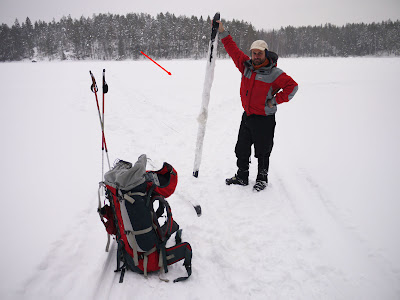Hi there
I guess I should start this with saying that most normal people think I'm an idiot, my friends on the other hand think I live life to the full and are all supportive of my way of living. I don't really fear anything (perhaps being incapacitated) but death has never fazed me. Perhaps its because I had my first OHS at 9, lost my best friend from Cancer at 21 and between the two times saw enough to let me know that life is about living and death is as far as we go here.
Consequentially I've lived my life doing stupid stuff (by the standards of others, as it happens I take safety seriously)
and
so that I can get to places like this:
so basically I'm completely unfamiliar with what people call anxiety attacks and I really just don't understand. I feel sympathetic, but I just don't understand. So with that in mind:
I am still having a difficult time picking a valve. While the idea of avoiding another surgery with a mechanical valve is very enticing, I am still extremely worried about being on coumadin.
to be frank, I think worry about coumadin is just something I can't understand at all. If you have
heaps of co-morbidities (diabetes, obesiety, poor circulation ...) then I can see a case for it. But everything I've ever read as well as my personal experience is that its all hyped up by those who are afraid of it.
I would choose any of the pyrolytic carbon valves and ask about the likelyhood of needing an aortic strengthening to reduce the risk of aneurysm later (I mean, while they've got the hood off and the pipes undone).
The data suggests that well managed self testing (and preferably self managing) patients are frequently within their INR range (something greater than 80%) and that within the INR range your likelyhood of issues is very minor.
People here will boogey man the whole thing up but if you're young fit and active then really its not an issue. If you're old frail and with a long list of co-morbidities then perhaps coumadin is an issue ... but then perhaps its not.
My personal experience is that I've had a long and difficult recovery from an infection which was given to me in the surgery for my valve. As I did not die, I didn't fall into any statistical category of "post surgical issues" and so my operation contributes nothing to stats. Remember - they talk about reoperations or deaths.
I see thread after thread here of young people who said "oh, I'm too active for this stuff, I'll have a tissue" and guess what ... we see them back here in (sadly) short times. Some have had less than 2 years.
http://www.valvereplacement.org/forums/showthread.php?42041-The-Surgeon-Choice&p=544427#post544427
I was age 41 when I received my bovine pericardial valve. My primary reason was to avoid the need for warfarin. I had good results with my first valve for 7 years. We replaced it last year because it had become severely calcified
http://www.valvereplacement.org/for...-needs-to-be-replaced-with-a-mechanical-valve
I just found out 2 weeks ago that I'm in severe stenosis again. Had a an echo and the result was critical - Dr asked me to come in urgently. He said the bovine/porcine valve did not take and since I'm young (52) I require more blood to pump and I need to replace with a mechanical valve.
http://www.valvereplacement.org/forums/showthread.php?39503-Tissue-valve-failing-after-6-months
I had OHS 6 months ago and received a St jude biocor 21 mm valve. It now seems that the valve is not working properly. It is still unclear what the exact problem is but my surgeon thought the leaflets of the valve appeared to be thickened which could be caused by calcification.
There are some more you can find ... and while many seem to take the 'replace it when its worn out' philosophy, that may work better when you're older and only ever need one replacement. Or it might not.
Another issues may be in difficulty in managing your INR (to put an argument for the opposite) I would suggest that you get blood tested for your CYP2C9 and VKORC1 alleles to see if you may have a genetic predisposition that makes management of warfarin difficult. You could also attempt to trial it for some time (although I'm told that its difficult to arrange ... beats me why surgeons would poohoo such a logical thing)
Anyway, I've had 3 surgeries now (9yo - repair, 28yo - homograft and 48yo - mechanical) and my surgeon was quite convinced of the issues of scar tissue in multiple surgeries. Here is another thread
http://www.valvereplacement.org/for...pped-night-before-surgery&p=541876#post541876
I was all set to have my 2nd AVR today when I met with my surgeon late yesterday afternoon and was told my CT scan showed MAJOR scar tissue covering all of the replaced aorta which was done during my 1st AVR for bicuspid 6.5 years ago.
Ultimately its your call.
Me, warfarin has done nothing to effect my lifestyle and right now I'm back in Finland and have just come in from skiing (cross country) as I'm back training (after the horrors of last year) so that I can keep living my crazy life.
Back in Australia I always play it safe in my life too, as my transport method is either my 4WD for camping, cycling around town or this:
live life ... don't fear it
Warfarin has enabled me to live my life and (God willing) never need another stupid surgery again!!
Oh ... and if you think nosocomial infections, I had propioni bacteria ... MSR would probably have put me onto the dead list ... and did you know that antiobiotics are becoming increasingly challenged these days?
Have a read of my personal experience with surgical infections and then let me know what is it about warfarin that's so bad for a healthy person?
http://www.valvereplacement.org/for...nd-feelings-(some-may-find-images-disturbing)









